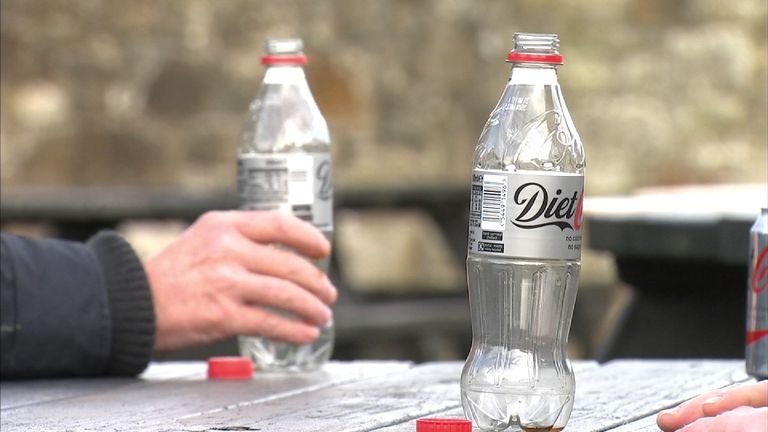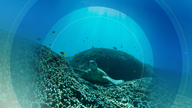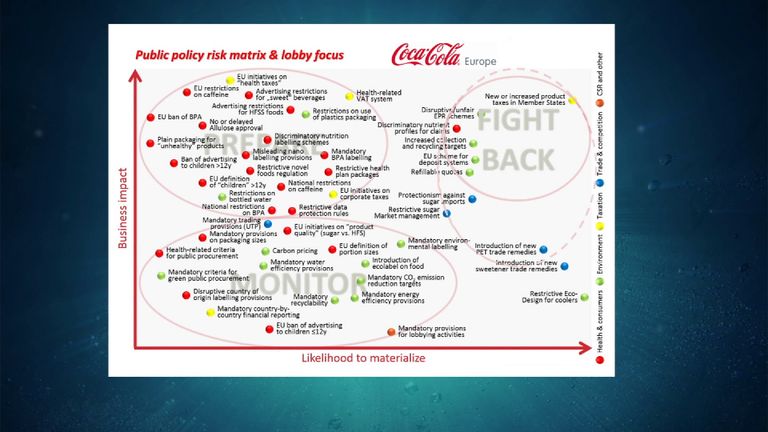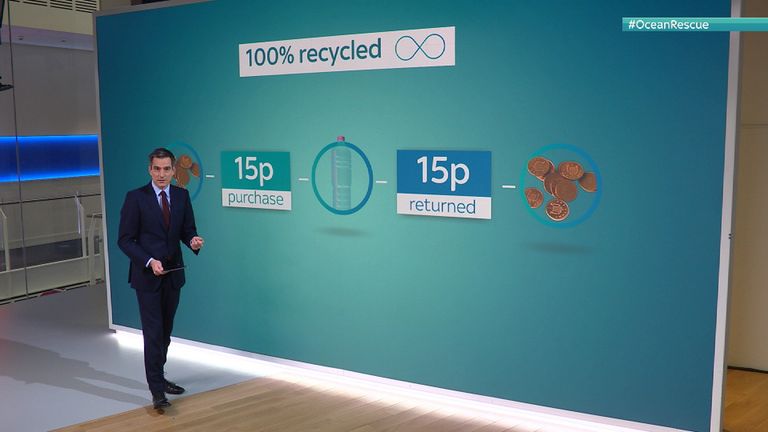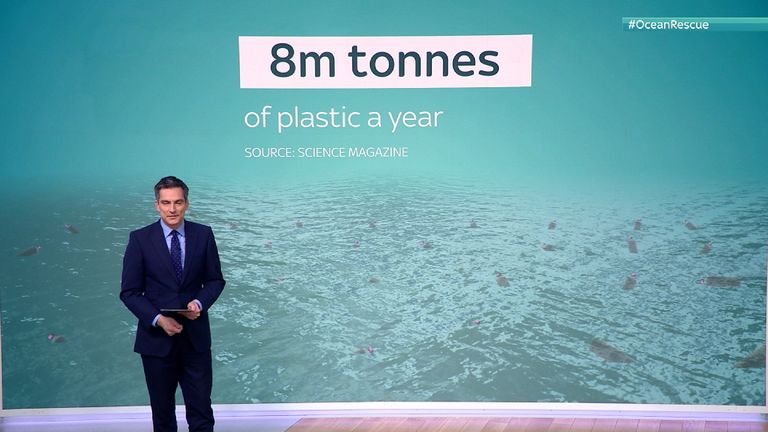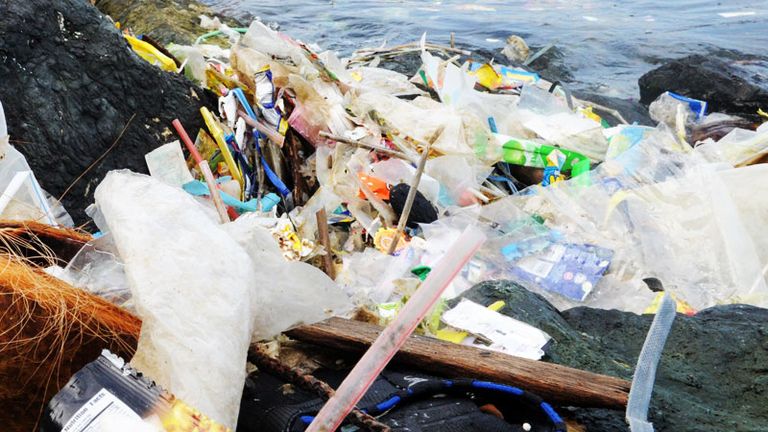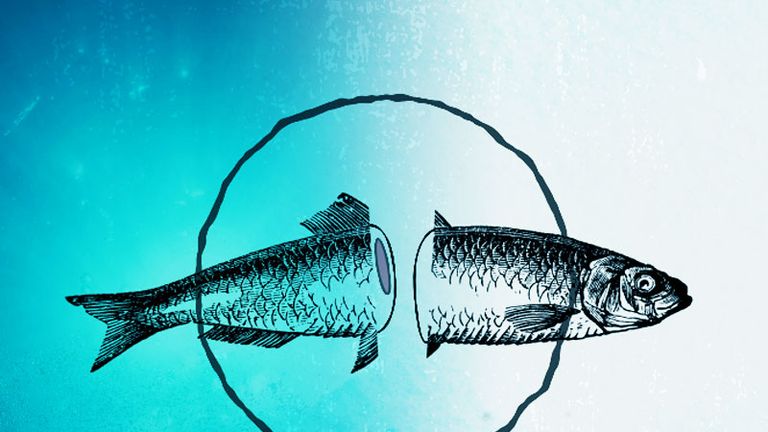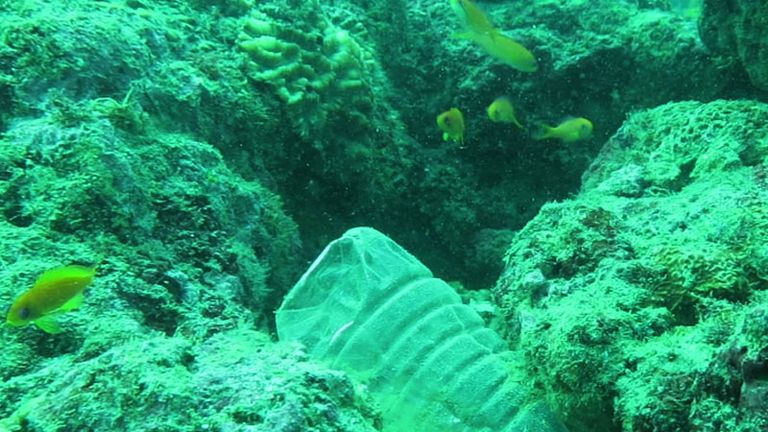Document reveals Coca-Cola opposes bottle return scheme
The beverage giant focuses a "risk matrix" against a bottle deposit scheme currently being considered by the Scottish Government.
Thursday 26 January 2017 18:10, UK
Sky News has seen an internal document that exposes the extent of Coca-Cola's opposition to the introduction of a Deposit Return Scheme in the UK.
The company report, written in March 2016, contains a "risk matrix" which targets EU deposit systems as a subject for "fightback".
It reflects Coca-Cola's assertive stance against the introduction of a DRS scheme, which is under consideration by the Scottish Government.
Such schemes have worked effectively in a number of European countries. A cost is added to the price of a drink, but the customer can reclaim a deposit upon returning the container to a shop or collection point.
The aim is to increase the re-use and recycling of drinks containers, but its implementation would mean companies face a hefty cost in terms of finances and logistics.
:: Sky Ocean Rescue: How can we solve the problem?
:: Sky Views: Why we're launching Sky Ocean Rescue
:: Sky Ocean Rescue: How bottle deposit scheme boosts recycling
In its "risk matrix", Coca-Cola outlines the issues on which it feels the need to focus its lobbying.
Included in the circle marked "fightback" are "EU Deposit Systems" and "increased targets for collection and recycling".
Environmental campaigners claim the strong language in private sits uneasily with a more measured tone in public.
Willie Mackenzie, of Greenpeace, told Sky News: "While customers would see the headlines 'Coca-Cola says good things, Coca-Cola's trying to do new things, Coca-Cola's trying to make it better', behind the scenes they are trying to defend the status quo and do as little change as possible.
"It's wrong - it's trying to undermine public opinion, political will and political processes and it's also not taking responsibility for the problem that they're creating."
Coca-Cola executives meet with lobby ministers on both sides of the border on a frequent basis.
In 2015, they used a visit by Scotland's First Minister Nicola Sturgeon to present the case against a DRS scheme face to face.
This was followed up by a letter to Ms Sturgeon from the industry body representing Coca-Cola and other major players in drinks manufacturing including AG Barr, the makers of Irn-Bru.
In the letter, seen by Sky News, the Packaging Recycling Group Scotland (PRGS) says of a DRS scheme: "It would cause expense and inconvenience to consumers, particularly vulnerable people, damage business and existing recycling and anti-littering initiatives."
Coca-Cola upset the charity Keep Scotland Beautiful in its submission to a Scottish Government consultation on DRS schemes in June 2015.
Coca-Cola "lifted" a line from the charity's own submission when it wrote: "We agree with Keep Scotland Beautiful who say 'the scale of the investment that would be required to roll out a DRS, and the lack of evidence that it would deliver any significant reduction in litter, means a DRS is not the right solution to the litter problem in Scotland at this time'."
Sky News has spoken to the charity which says it was not consulted by Coca-Cola beforehand and is unhappy at what it sees as selective quoting, pointing out that it is not opposed to a DRS scheme in principle.
Campbell Evans, of the PRGS, the industry body lobbying against a DRS scheme, told Sky News: "I think what we're saying is that Scotland is different from everywhere else.
"There are huge costs going to be brought into this and we're not sure that we see any benefits because, at the moment, we're seeing 80% of households getting everything delivered on their doorstep and at the bottom of their drive. We don't want to throw that out.
"What we want to do is get behind the Scottish Government's household recycling scheme and make that work."
In a statement, a spokesperson for Coca-Cola told Sky News: "Our packaging is not only valuable, but is also essential for our business and vital for people to be able to enjoy our drinks.
"Any changes to policy around it are therefore important to us and so no one should be surprised that we closely follow these discussions.
"We meet with a wide range of organisations and individuals with an interest in a given topic, including politicians, Government officials, charities and campaign groups, to understand their latest thinking on policy issues.
"In Scotland, along with other drinks manufacturers, we have had several constructive meetings with the Government, policy makers, industry groups and NGOs to discuss plans to reduce littering and increase recycling.
"We hold regular meetings with NGOs to update them on our progress towards delivering our current ambitions to boost the sustainability of our packaging and seek their advice on where we could improve things in future.
"Only last week, we organised a round table with 15 expert organisations and campaign groups, including Greenpeace, to ask them what more they thought we should be doing to help improve packaging recovery and recycling in the UK.
"We support recovery and recycling of our packaging and we want to help find ways to ensure that less of it is littered and ends up in the sea.
"Whilst we support and participate in deposit schemes in some countries, in some cases we have believed a different approach could be more effective and more sustainable than DRS - and in the UK we have raised some concerns about the impact of a DRS scheme on household recycling rates.
"However, we are open to engaging in constructive dialogue and working with others to create effective, long-term solutions."
:: You can find out more about Sky Ocean Rescue and get involved by visiting the campaign's website.

